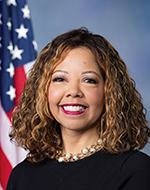The Honorable Lucy McBath: Combatting Cancer and Disparities in Health Care

I’m a wife, mother, gun violence prevention advocate, and member of Congress. I am also a two-time breast cancer survivor, and I think it is important to share my experience fighting cancer and speak more about how important it is to support the importance of medical research, which can help in the treatment of cancer and the development of a cure.
I was first diagnosed in 2002 during a routine mammogram. The doctors noticed calcifications on the images they took. They informed me that they found a
sizeable lump in my left breast and then scheduled a biopsy. Miraculously, the mass they initially found disappeared, which was confirmed by additional X-rays and consultations with other physicians. My faith and the support of my family were essential in my fight against breast cancer. Several years later I was diagnosed with cancer again, and it was really difficult for my son, Jordan. Jordan was a teenager, and he felt helpless and afraid and didn’t quite know how to deal with my diagnosis. I did everything I could to shield him from watching me go through treatment, because I knew that would be tough on him. Having survived cancer twice and having gone through all the treatments has really helped me understand how precious life is—it really is a gift.
During the time between my diagnoses, new medicines and more effective treatments were made available, and I’ve seen firsthand the importance of federal investment in medical research. During my second cancer fight, I would go to work in the morning, drive to the hospital to get my treatment, and then would go back to work after it was over. Many people with cancer can now live fairly normal lives
outside of their treatment, and that is so important because it allows people to have a sense of normalcy. They can continue to be with their friends and loved ones and just focus on getting better.
Had it not been for much of this valuable medical research and the innovative and new treatments born out of the research, I’m not sure I would be here today. As a member of Congress, my focus has been on making sure that researchers have access to the funds they need to create new treatments and discover new cures. I have supported increases in funding to the National Institutes of Health (NIH) and Department of Defense’s (DOD) Congressionally Directed Medical Research Programs that support cancer research. I have also supported increased public health measures, such as screening for prostate and breast cancer. I owe my life to the scientists, physicians, and medical professionals that work every single day to help people like me. They are truly saving lives.
Unfortunately, there are many health inequities that communities of color face, and this has played an integral role in the poor outcomes we are seeing today.
I believe that we must invest in those communities that are suffering these disparities. If we want to decrease the incidences of cancer, there are a host of social ills we must identify and address. I have introduced bills that would use federal agencies to address the social determinants of health in health-impoverished communities. I have worked and will continue to work very hard to identify and break down the barriers that prevent people from accessing the health care they need to have healthier and longer lives.
Groups like the American Association for Cancer Research (AACR), and other advocacy groups, play an important role in communicating the needs of the cancer
research community to Congress. They have done an excellent job in explaining how far NIH dollars go into the community and how important federally funded research is to innovation in medical research. The AACR has also been successful in putting a human face to cancer. All too often policy comes down to some stats on a sheet, and while understanding the scope of the problem is important, there is nothing more powerful than having that face to face interaction with advocates. Hearing their struggles and passion helps makes us better policy makers.
In the meantime, my health is great, and I feel really good, and I am so thankful. Like most cancer survivors, I am concerned about cancer recurrence. Like many cancer survivors, when I go for my follow-up exams, there is always a bit of hesitation and anxiousness. But I feel so lucky to be doing the work I am doing, and I try to live my life every day the best I can because there is still so much work to do.